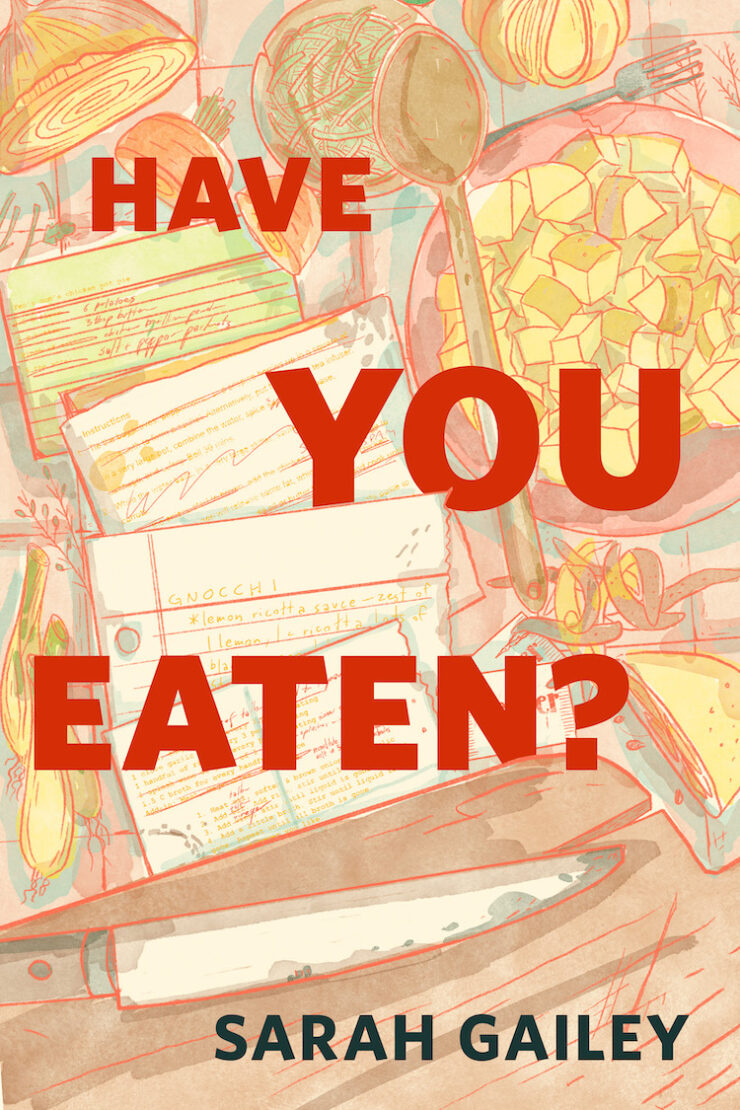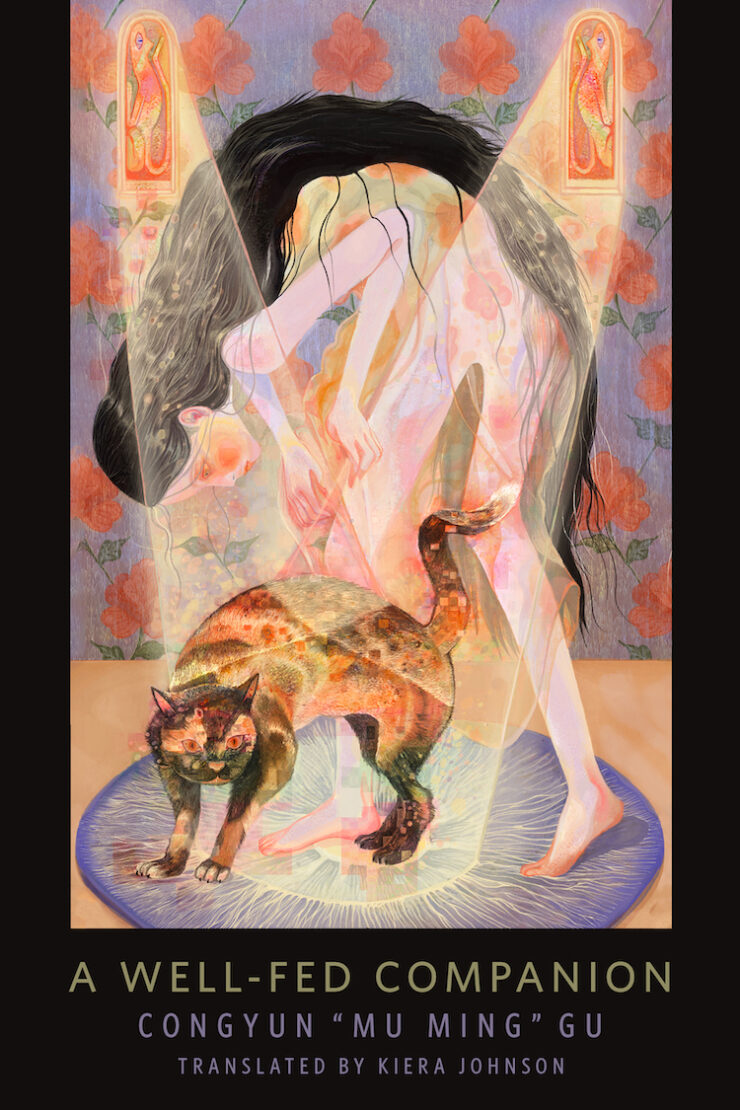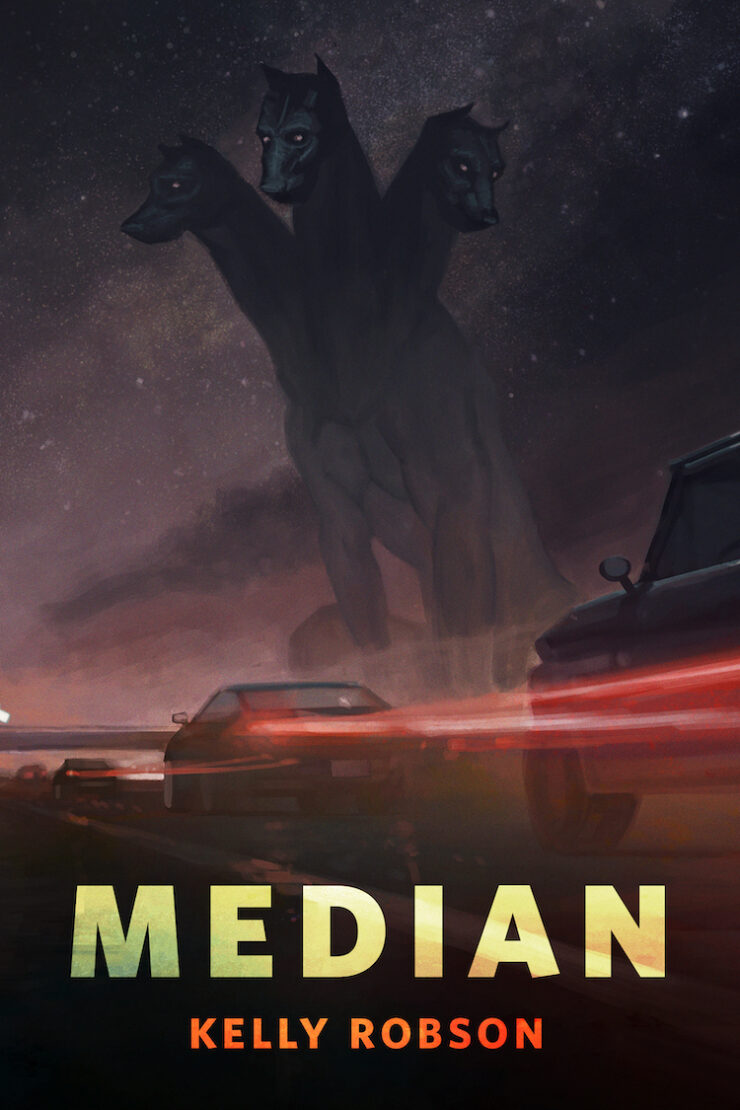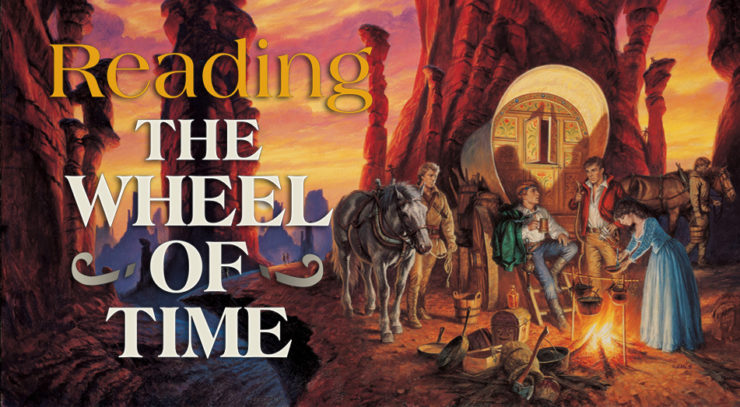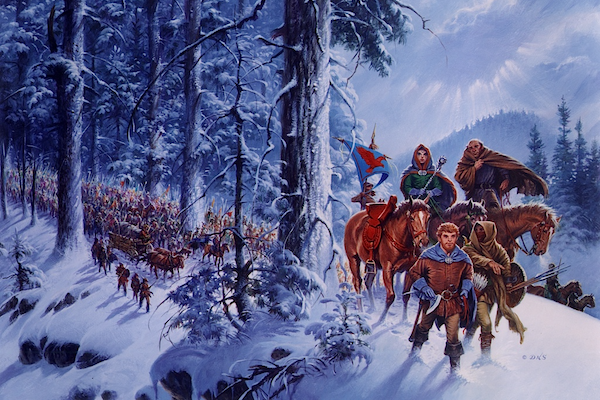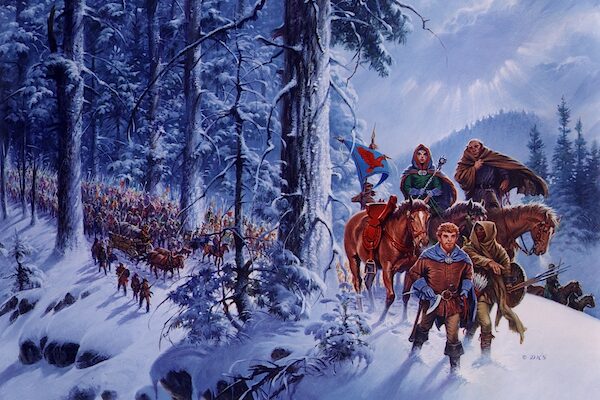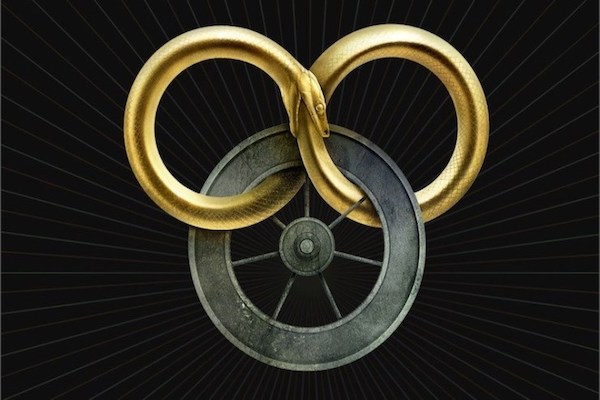Welcome back to our regularly scheduled Reading the Wheel of Time. After a brief foray into essay mode, we’re back to cover Chapters 36 and 37, in which Aviendha is really annoying, and we meet some peddlers who set off Rand’s alarm bells… and mine. I have to admit, it’s been a while since I’ve been as tempted to take a spoilery peek ahead as I am by the arrival of Kadere, Keille, and Isendre. Also, I take a lot of umbrage at the way Keille is described by the narrative. Oh and also Trollocs again. Fun times!
The Aiel break camp before dawn, traveling in three separate parties, Rand and Mat with Rhuarc and the Jindo while Egwene and Moiraine travel with the Wise Ones. Their group sets themselves between the Jindo group and that of the Shaido, who are also traveling in the same direction, and Rand rather suspects that the center group is the only reason that the Shaido don’t attack, even though the peace of Rhuidean is supposed to extend until travelers reach their own hold again. Rand notices that middle group watching him, and seemingly discussing him, too.
Aviendha, who has been at his side since he awoke that morning, abruptly interjects over his thoughts to tell him that Elayne is the woman for him, lecturing at length about his “treatment” of her and how he belongs with a wetlander, one of his own kind. She even begins to describe what Elayne looks like naked, shocking and confusing Rand. Aviendha insists that Elayne has bared her heart to him and that she meant everything she said in her letters, but this only furthers Rand’s confusion, as the letters were contradictory.
Rand is sure that the Wise Ones sent her to spy on him, and that he isn’t supposed to realize it. But he can’t figure out why she is wearing a skirt and blouse now, or why she went to Rhuidean. When he finally gets her to stop talking, she continues to stomp along at his side and stare at him.
“Why are you looking at me like that?” he demanded.
“I am listening, Rand al’Thor, since you wish me to be silent.” She smiled around gritted teeth. “Do you not enjoy having me listen to you?”
Mat, meanwhile, is avoiding looking at Rand and Aviendha. He, too, is aware of the Wise Ones watching Rand, although it rather feels like they are watching him. He thinks that, if he had any sense, he would leave—he went to Rhuidean as the “snake folk” had told him he must. Still, trying to find his own way out of the Waste is a daunting prospect.
Buy the Book
Rhythm of War
One of the Maidens—Dorindha, one of the ones he played Maiden’s Kiss with—comes over to deliver news to Rhuarc, and the clan chief announces to them that there were peddlers’ wagons approaching. Mat is surprised at how grim the Aiel look as they approach the wagons, since he had heard that peddlers, gleemen, and Tinkers were the three people welcome in the Waste. “Peddlers and gleemen are welcome,” Heirn corrects, but Mat sees little welcome in the Aiel. Rand intercedes when he tries to ask about the Traveling People.
Rhuarc and Heirn, Mat and Rand (and Rand’s escort of Jindo protectors) go forward to meet the peddler, and Couladin comes over from the Shaido party. Moiraine starts to come as well, but the Wise Ones stop her. The wagon drivers are rough looking men, but they still seem anxious at the approach of the Aiel. The peddler, a heavy-set muscular man in a wide-brimmed hat, introduces himself as Hadnan Kadere and claims to be looking for Cold Rocks Hold. Rhuarc tells him that he is nowhere near Cold Rocks Hold, and asks why he doesn’t have an Aiel guide. The man nervously insists that he has traveled openly, and thought perhaps there were no guides this far south.
“There are always guides,” Rhuarc said coldly. “You have luck to have come so far without one. Luck that you are not dead, or walking back to the Dragonwall in your skin.” Kadere flashed an uneasy, toothy smile, and the clan chief went on. “Luck to meet us. Had you continued this way another day or two, you would have reached Rhuidean.”
The peddler appears quite alarmed by that, insisting that he had no idea, and Rhuarc tells him that he may travel with the Jindo back to Cold Rocks Hold. Couladin protests that by custom, the peddler should travel with the more numerous party, the Shaido, and Rhuarc reminds him that he is not a clan chief, and that the peddler said that he seeks Cold Rocks Hold specifically. Couladin backs down a little, but reminds Rhuarc that He Who Comes With The Dawn concerns all the Aiel, not just the Taardad.
Kadere just seems relieved that the Aiel aren’t going to kill him. He is told that he can trade when they stop for the night, but Mat rides closer and remarks that he’d give a gold mark for a hat like the one the peddler is wearing. A woman’s voice calls out “done,” and a very large woman with a “hatchet-like” nose emerges from one of the wagons. Her voice is husky and melodious, which Mat finds very at odds with her unfortunate appearance. Despite her size, she does seem to move with a great lightness.
“A good offer,” she said in those musical tones. “I am Keille Shaogi, peddler.” She snatched the hat away from Kadere and thrust it up at Mat. “Stout, good sir, and nearly new. You will need its like to survive the Three-fold Land. Here, a man can die…” Fat fingers made a whip-crack. “…like so.” Her sudden laugh had the same throaty, caressing quality as her voice. “Or a woman. A gold mark, you said.” When he hesitated, her half-buried eyes glittered raven black. “I seldom offer any man a bargain twice.”
The peddler hardly makes a complaint as Mat decides that the hat really is worth the money and hands over the coin. He finds that the hat fits, and is nice and shady. Keille tries to trade with Aviendha (calling her a pretty child) and Rand, before Kadere interrupts her and tells her that the trading is done for the night. She returns to the wagon, ordering him not to keep “these good sirs” standing there. Mat and Rand both catch sight of a gleeman in her wagon.
Rand tells Mat that Kadere is a dangerous man, that he acted nervous and sweaty but his eyes never changed. He warns Mat that you have to watch the eyes, then turns and begins studying the landscape, murmuring about how time sets snares, and how he has to avoid theirs while setting his own. Mat presses for answers, and Rand leans in and tells him that they are riding with evil now. Mat asks if he thinks Kadere is evil.
“A dangerous man, Mat—the eyes always give it away—yet who can say? But what cause have I to worry, with Moiraine and the Wise Ones watching out for me? And we mustn’t forget Lanfear. Has any man ever been under so many watchful eyes?” Abruptly Rand straightened in his saddle. “It has begun,” he said quietly. “Wish that I have your luck, Mat. It has begun, and there is no turning back, now, however the blade falls.” Nodding to himself, he started his dapple after Rhuarc, Aviendha trotting alongside, the hundred Jindo following.
Mat follows too, thinking that it had started in Rhuidean, or a year ago on Wintersnight, and wondering if Rand was approaching the edge of madness now. He needed to get out of the Waste, perhaps with the peddler’s wagons, if it wasn’t already too late.
As they near Imre Stand, Rand notes that the Wise Ones aren’t watching him, for once—they’re all walking with Moiraine looking at something shiny she’s holding in her hands, and Lan is riding back with the packhorses as though they sent him away. Somehow this makes him as nervous as when they’re watching him, and he wonders if he can still trust Egwene. He chuckles bitterly to himself, attracting Aviendha’s attention. When she begins to upbraid him again, Rand tells her that if she has no respect for He Who Comes With The Dawn she could at least show some for the Car’a’carn. Rhuarc tells him that the Car’a’carn is not like a wetland king, and anyone can speak to him. He agrees that some do push the bounds of honor, though, and Aviendha falls back into an angry silence.
A Maiden comes to Rhuarc with a message that there is trouble at Imre Stand, and that there appears to be no one there. Rhuarc sends her to inform the Wise Ones, but that group already seems to know. Rand has to press Aviendha, but eventually she informs him that this most likely means that there was a raid, and that the goat herds and gai’shain are probably miles gone by now. And they can’t spare anyone to go recover the herd because they have to look after Rand. But when they arrive at Imre Stand—the Aiel veiled and Rand following cautiously, not wanting to fall into a trap—they find a few goats still there, grazing, as though the herd had just been left to wander away. Aviendha tells Rand that raiders would not have left any animals. And then they look inside the buildings, and find that they have been ransacked, and everything is covered in dried blood.
“When he realized what it was, he jerked back, the Power-wrought sword coming into his hands before he even thought. Blood. So much blood. There had been slaughter done here, as savage as anything he could imagine. Nothing moved out there except the goats.
Aviendha backed out as fast as she went in. “Who?” she demanded incredulously, her large blue-green eyes filled with outrage. “Who would do this? Where are the dead?”
Mat says it looks like Trolloc work, but Aviendha retorts that Trollocs don’t come into the Three-Fold land, not more than a few miles below the Blight. Aiel hunt Trollocs, not the other way around.
The Aiel and the wagons are brought in, and for a while everything is a bustle of activity, setting up camps and gathering water from the tiny spring. The peddlers set up on the edge of the Jindo camp, and at one point a woman in a red silk gown and an opaque veil descended out of the wagons. Rand watched Kadere take her to see the blood-stained room, and afterwards deems her theatrical shudder to be fake. She comes over to greet Rand, the one the Aiel call He Who Comes With The Dawn, and tells him that she’d thought he would be handsomer.
Once she has gone back to the wagons, Kadere apologizes, saying that Isendre is too forward sometimes, and remarks that he has heard that Rand is also the man who took Callandor from the Stone. Rand notes to himself that if the man knows that, then he knows that Rand is the Dragon Reborn, and a channeler, and yet still his eyes don’t change. Rand answers obliquely, and Kadere expresses the hope that they will have another chance to talk
Before he’s gone more than a few steps from him, Aviendha once again starts hounding him about Elayne, and how he will look at any woman, and would he look at her if she was so scantily dressed. When Rand tries to stalk off, she follows him, so Rand goes to Lan and asks him to watch him work the forms, hoping that the Aiel hatred of swords will drive her off. He tries to lose himself in the work, but the hot sun and Aviendha’s watchfulness keep him distracted, and Lan notices. They talk about the importance of concentration, and then Rand asks how the Aiel fight, and for some tactical advice, including how you might fight against them. Aviendha interjects that Lan’s tactics won’t work and asks why Rand wants to fight Aiel when he is meant to lead them.
“It has worked well enough with Bordermen from time to time.” Rhuarc’s soft boots made very little sound on the hard ground. He had a waterskin under his arm. “Allowances are always made when someone suffers a disappointment, Aviendha, but there is a limit to sulking. You gave up the spear for your obligation to the people and the blood. One day no doubt you will be making a clan chief do what you want instead of what he wants, but if instead you are Wise One to the smallest hold of the smallest sept of the Taardad, the obligation remains, and it cannot be met by tantrums.”
Rand feels foolish for not recognizing that Aviendha has changed her clothes and manner because she is going to become a Wise One, and wonders if she can channel. He thinks about how Min is the only woman in his life who can’t.
Rhuarc offers to teach Rand the spear, and although Rand is already exhausted and really wants to go lay down, he can see that all the Aiel are watching. And they are his people, who had just watched him practice with a weapon they despise. So he agrees, telling himself that Aviendha watching has nothing to do with it, that it’s just because of the others.
Mat, meanwhile, has bought himself a mug of ale and is sipping the unfortunately warm beverage as he leans against a wagon wheel and watches the Aiel trade with the peddlers. Mat finds it interesting watching what sells and for what price, and notes that the Aiel are canny traders with a good sense of the value of things. He catches sight of one of the traders offering a fancy gold crossbow, and his mind wanders, thinking about the tactical advantages in arming men with such a weapon for battle. Then he catches himself, frustrated that such a train of thought has happened again.
He thinks about the things he obtained on the other side of the redstone doorway—the silver foxhead medallion, the black-hafted spear with the blade marked by two ravens, and the new memories filling in the holes that had been there before he went to Rhuidean.
Waking dreams, or something very like. It was as if he could remember dances and battles and streets and cities, none of which he had ever really seen, none of which he was sure had ever existed, like a hundred pieces of memory from a hundred different men. Better to think of them as dreams, maybe—a little better—yet he was as sure in them as in any of his own remembrances. Battles numbered the most, and sometimes they crept up on him in a way, as with the crossbow. He would find himself looking at a piece of ground and planning how to set an ambush there, or defend against one, or how to set an army for battle. It was madness.
He can also read the old tongue perfectly now. The gleeman overhears Mat mutter a phrase to himself and remarks that Mat must be a scholar. Mat insists that he only knows a few phrases that he’s picked up here and there during his travels. The gleeman introduces himself as Jasin Natael, who remarks how interesting a life Mat leads, traveling with Aiel and Aes Sedai and He Who Comes With The Dawn. Mat assumes the Aiel have talked about it with the strangers, and tries to get the gleeman to go bother Rand instead, but instead Natael gets him to talk about his experience in Rhuidean, claiming he wants to make a song about it. Mat leaves out the doorway and the bubble-of-evil dirt monsters, but ends up talking at length about the trip through the mist and what he saw on the other side, urged to greater and greater detail by Natael.
Keille appears suddenly to ask what Natael is doing, and the two have an argument about it, with Natael apparently browbeating the woman into silence, eventually. Mat is relieved when she leaves, though his thoughts turn to Isendre and how for her, he’d tell everything about his adventure, and make himself sound like a hero.
He eats dinner at Rhuarc’s fire with Heirn and Rand. Aviendha and the peddlers are also there, and when everyone is finished eating the Aiel ask the gleeman for a song. Natael fetches his harp and sings an old war song set in Manetheren. As he sings Mat remembers the battle, and what was different about it than the song tells. When Natael is done he asks if Mat disliked the song. Mat covers, saying that he isn’t sure it’s wise trusting to the generosity of one’s enemies (a move that paid off in the song, but not in the real battle Mat remembers), and asks Kadere what he thinks.
The peddler hesitated, glancing at [Isendre] clinging to his arm. “I do not think of such things,” he said at last. “I think of profits, not battles.” Keille laughed coarsely. At least, until she saw Isendre’s smile, condescending to a woman who could make three of her; then her dark eyes glittered dangerously behind those rolls of fat.
And then the Trolloc attack comes, led by Myrddraal. Mat finds himself hard pressed, but with the aid of the Aiel around him and the memories that make him proficient with his new spear weapon, he survives. Rand comes over to check that Mat’s okay, along with Aviendha, who has found a spear and buckler somewhere. Rhuarc reports that another group of Trollocs attacked the Wise Ones’ camp, and a smaller group attacked the Shaido, almost as though they were just there to prevent anyone from coming to their aid. Rand tells him to remember that he brings enemies with him.
The peddlers and Natael emerge from the wagons, unhurt even though some of the wagons have been set on fire. Mat calls the decision to shelter inside foolish, but Rand points out that they are all still alive. That’s what’s important, because just like dice, you can’t win if you can’t play.
When Moiraine does make it over, Rand lets her check on him, even though he hadn’t been injured. There are too many hurt Aiel for her to spare Healing to wash away his fatigue, but she makes sure to point out that this attack was meant for him. Egwene comes next, telling him sharply to stop doing whatever it is he is doing to upset Aviendha, before stalking off again. Rand thinks that she looks silly with her beribboned pigtails before stumbling off to his tent, feeling more tired than he ever has before. Even the flame sword had almost not come, and it was the one aspect of channeling that he has never struggled with before, the one thing that had always come almost without thought. He tells himself it is just the tiredness. Aviendha follows him to his tent, and is still there outside, sitting crossed-legged, in the morning.
Rand finds that he’s glad to see her—at least he knew who she was and what she thought about him.
Oh Mat. The peddlers were perfectly safe in their wagons because they are Darkfriends. They probably knew the attack was coming, and I’m sure the Trollocs purposefully set fire only to the wagons those folks weren’t in.
So this felt like a weird section to recap because of the way that the narration handles how Rand has changed. I’m not sure if this is supposed to indicate something about his mental state under the taint or if it’s merely a narrative choice to increase suspense, but I find it a bit odd. We’re so used to having a tight pov on whichever character is the focus, to understanding most of what is going on in their heads, that this shift to distance and mystery with Rand feels jarring. Of course, Jordan has used the technique before, having characters vaguely think about “the plan” or something like that, in order not to give too much away—he’s done it with Moiraine a few times, and it’s common when we’re in the head of one of the baddies—but not to this extent. It kind of makes me feel distant from Rand, like I can’t connect to him the way I can with Perrin or Mat.
The threat of the taint madness is ever-present, but like the characters, I can’t even begin to tell if it’s starting to come upon Rand yet. Mat (and everyone else, really, but especially Mat) tends to assume anything Rand says or does that doesn’t have an obvious explanation means that he’s losing it, which is rather extreme. I understand how their suspicious are motivated by their fear and knowledge of the inevitable, but I tend to assume that most of them are overreacting due to that worry. And as for Rand, well… Would the narration really be able to communicate his deterioration? Would he be able to know that he was losing it? Ordeith Fain is aware of his own madness sometimes, so maybe?
In any case, I think this might be one of those problems that are a result of the artificial pacing imposed by this read: Normally I’d be tearing ahead rather than stopping and musing every other chapter, which does interrupt the flow of the book at times. Maybe I’d be less frustrated if I was reading at a traditional pace? But then again, maybe not. I mean, what’s the point of a close third person in every other major character if we’re still going to feel like we’re held at arm’s length from our hero?
Holding people at arm’s length from their own thoughts and feelings is what the folks of the Wheel of Time do best, though. From Rand’s (quite justified, really) fear that both Moiraine and the Wise Ones want to use him, to Mat’s secretiveness about everything, to whatever bee has got into Aviendha’s bonnet, it can be frustrating, even aggravating, to watch all these people dislike and mistrust each other when they are supposed to be on the same side. I mean, they have Aviendha spying on Rand (can you even call it spying when it’s so completely obvious?) and Moiraine is doing her listening trick with her little jeweled pendant to eavesdrop on everyone’s conversations. I wouldn’t trust them either! They’re all convinced that Rand needs aid and guidance, but they haven’t even attempted to reach out to him with an honest offer of help.
I’ve observed before that mistrust is a weapon of the Shadow, but I also think that a lot of this comes back to this theme of manipulation. The concept has popped up in every society we meet, in a multitude of ways, from gendered power play, to the Game of Houses, to the way the Wise Ones punish people with humiliation and the Aiel in general punish people with forced nudity. You know, I really miss Shienar right now. No one is perfect, but they were so much more straightforward and refreshing to deal with. Even logical, plain speaking Perrin is caught up with Faile and her games now. I just feel like these people must be so tired all the time.
And what is Aviendha’s deal, anyway? I mean, I think I have a pretty good guess—she hasn’t said what’s bothering her, but her emotions around it have been far from subtle. I think Aviendha is going to turn out to be the third woman who is supposed to end up falling in love with Rand, the last face from Min’s vision that she didn’t recognize. If the three rings that the women in Rhuidean go through work about the same way as the three-arched ter’angreal that the White Tower uses in the raising of Novices to Accepted, then perhaps Aviendha faced a trial or trials that are very similar to what we saw Egwene go through. And perhaps she saw a possible future for herself in which she was in love with or married to Rand.
It would make sense of how she reacted to the Wise Ones’ command to stay near and listen to him. Her objection was intensely personal, that she didn’t like him, that she hated him. Since the Wise Ones also know the true history of the Aiel and the prophecies of He Who Comes With The Dawn, it’s easy to assume she’s objecting to Rand because of that new knowledge. But if my theory is right, she’s not just objecting to her shifting duty and the loss of being a maiden, but to a more personal future that she can’t fathom wanting, and probably feels even less necessary to her duty than giving up the spear.
If I’m right, it would go far in explaining why she’s harping so much on this idea that Rand has betrayed or hurt Elayne. Rand can’t figure out what she’s talking about because the thing Aviendha is angry about hasn’t happened yet. And Aviendha might not just be angry at Rand—she might also feel guilty at the thought that she might one day betray Elayne. Min’s vision (and doesn’t it seem like an awful coincidence that Rand is suddenly thinking about Min for the first time since their paths parted) said that Rand would have three women attached to him, but Aviendha may very well have only seen her own future. And I mean, that whole “you need to marry a wetlander, stick to your own kind” spiel seems like a pretty big giveaway.
And I get that the whole thing of describing Elayne naked is mostly just a narrative moment to make Rand uncomfortable and give the reader a chuckle at his expense, but it just comes off badly, especially with how nudity seems to be a form of punishment for the Aiel. They’re always talking about stripping people naked and running them off their land, and then there’s Amys turning Egwene upside down so her nightdress falls down around her armpits and exposes her body. Not to mention the fact that women are required not only to get naked before going into the ter’angreal, but to go all the way to and from Rhuidean for some reason? There is no logic in this—why not just take your clothes off and leave them at the base of the rings before you go in? I feel like this is just done so the reader can picture Aviendha and Moiraine naked.
It is, however, very interesting to me that the Wise Ones use a similar type of ter’angreal as the Aes Sedai of the White Tower. As far as I have seen, there is no reason to believe that these ter’angreal were used for rite of passage purposes in the Age of Legends, so how did these two cultures end up in such a similar place? Why make seeing your own future a trial, rather than something that is only attempted at need by the already adept?
As for Kadere and company… they have to be Darkfriends, right? I would even go so far as to say they’re Forsaken in disguise, at least some of them, but the cover seems too ignominious. Would those haughty Forsaken stoop to present themselves as anything that wasn’t a high born lord or lady? I suppose it’s a question of whether their need can trump their pride (and there’s always the chance the Dark One commands them to do something). We have seen Lanfear pass herself off as an ugly old lady in Tel’aran’rhiod, and she seemed to just find it amusing.
Even without Mat’s warnings about Kadere’s unchanging eyes, there is something really ominous about the main three (I’m on the fence about the gleeman). Rhuarc points out that it is improbable that they should have made it so deeply into the Waste without encountering any Aiel and obtaining the required guide, and it seems far too coincidental that they claim to be on their way to Cold Rocks Hold when they are in fact making a straight line to Rhuidean. They also really do know too much. Couladin says the title He Who Comes With The Dawn in front of Kadere, but why should the peddler or any of the others know what that title means? How does Kadere recognize Rand as the man who took Callandor? It’s not like the average citizen of Tear knows what he looks like (he enjoyed riding out of Tear with the Aiel because he wasn’t particularly remarkable in comparison to the others) and if Kadere was close enough to get a look at Rand while he was staying in the Stone, I think Rand would’ve known about it.
Natael is the only one who didn’t do anything particularly suspicious, as far as I can tell, but he did get a lot of information out of Mat, which is worrying narratively (what happens in Rhuidean stays in Rhuidean, Mat!) even if it makes sense that a gleeman would have such an interest. At least Mat doesn’t know what Rand or Moiraine knows. I also noticed that, while Keille seems to be the boss of Kadere, Natael is able to “browbeat” her into silence after she tries to stop him from talking with Mat. That was a surprise and I don’t really understand how it happened, but I am quite suspicious about it.
Of course we can’t talk about Keille without addressing the fatphobia in the room. I get a very Baron Harkonnen of Dune vibe off of the way she is described here, and although the narration has occasionally mentioned that someone has girth or made a point of stating that someone’s size is mostly muscle, this is the first time we’ve seen such a focus on someone’s weight, and how that weight hangs on her body, how her clothes are stretched across her bulk, how the fat obscures whether or not her eyes are tilted which… I mean I’ve been glossing over the whole using the term “tilted eyes” to suggest someone’s origin thing, because what is there to say besides that it’s kind of racist? But seeing the two here in conjunction really made me uncomfortable.
There’s also a focus on the apparent incongruity of her voice (and why should a big woman not have a lovely voice?) and the gracefulness of her movements (again, same) which makes me think that the manner in which she is fat is supposed to be a clue of some sort. She’s clearly canny and in charge, at least of the business end of things (Isendre seems to condescend towards her, and there’s the aforementioned altercation with Natael) which is why I’m feeling the Baron Harkonnen comparison. The fatness is there either to communicate something to the reader, or to hide something from Rand and the others… or perhaps both. That doesn’t make it okay, though.
If peddlers and company are there to spy on Rand, then Isendre is the honeypot. She hasn’t done much besides walk enticingly and wear slinky clothing, but Mat sure has noticed her, and she is definitely interested in Rand. It’s a more obvious move than Lanfear’s alter ego in Selene, appealing directly to his sexuality rather than trying to appeal to his manly heroism (and then his sexuality), and it’s unlikely to work on Rand. He’s noticed how she seemed to be faking her reaction to seeing the blood left by the Trolloc attack, for one, and for two, he doesn’t like the direct approach. Lanfear could tell Isendre that, since pushing that angle was one of the things that led to the Selene persona not working.
I feel like I’ve listed a lot of things about this section that I don’t like. One thing I loved, however, is getting to find out what’s going on with Mat. And it is fascinating. Apparently when he asked for the holes in his memories to be filled, the foxy people gave him memories of his previous lives rather than filling in what actually happened in this one. But it’s less clear right now what two items they gave him are for, so let’s break it down.
Mat asked for three things, although he doesn’t realize that was the bargain he was making until after. He says “If I had my way, I would want those [memory] holes filled,” and later says “I want a way to be free of Aes Sedai and the Power, and I want to be away from you and back to Rhuidean”. The back to Rhuidean thing is apparently the only reason Mat is still alive—the foxy people would have killed him on their side of the doorway instead of his if going back hadn’t been part of the deal (“Wise to ask leavetaking, when you set no price, no terms,” they told him, “Yet fool not to first agree on price.”) Because he was returned before he was hanged, however, Rand was able to save him.
An aside: I wonder if that is what the snake folk meant when they said Mat had to die and live again. I had interpreted it that way, Mat had stopped breathing and Rand had to resuscitate him—that’s basically dying for a second. But Mat seems not to see it that way, and I don’t imagine the narrative would be doing that for no reason. Unless it’s a setup to have Mat worried and anxious for a while and then to have Rand be like, “but you already died and I brought you back so you’re fine now”? I’m honestly not sure.
So the first thing he wanted was the holes in his memory filled, which was done. The last was to be returned, which was done, and the spear is part of that. “Their joke,” Mat said, although I wonder if there is something more to the point of the spear than just a clever way to write their little poem. It’s of Aes Sedai make, after all, well made and engraved with ravens for some reason (I get that it’s another Odin reference here, but what’s the in-world significance?). It seems like an odd thing to part with for no reason, though I suppose it’s possible that the snake people don’t have any attachment to such things, Power-wrought or no.
Now that just leaves the middle “I want” which was to be free of Aes Sedai and the Power. The foxy medallion must have something to do with that. Mat is still traveling around with Moiraine and other channelers, and still seems to be held by Rand’s ta’veren power. The only clue I can see is that the medallion seems to grow cold during the fight with the Trollocs—at first I had wondered if it wasn’t sort of like the Sting from The Lord of the Rings, with the blade that glows when orcs are close. But warning Mat of nearby Trollocs, while useful, doesn’t have anything to do with getting him away from Aes Sedai and the Power. Maybe it’s an Aes Sedai detector? Feeling cold while channeling occurs nearby has been set up as far back as the race to Taren Ferry in the beginning of The Eye of the World, and Egwene, Moiraine, and Rand would all have been channeling during the battle. So it’s possible that the medallion is warning about that. Seems like it should do more than just let him know when channelers are near, though.
Next week we move away from hanging out with Rand and the Aiel and make our way to Tanchico, where Elayne and Nynaeve are headed, and where there are apparently Seanchan waiting. The Seanchan are currently fighting the Whitecloaks for the title belt as my most hated bad guys, so it’ll be interesting seeing how that goes. Come back next week for Chapters 39 and 40, and keep an eye peeled on the site for more Wheel of Time content!
Sylas K Barrett learned his lesson from The Wheel of Time early. You never trust a peddler.



